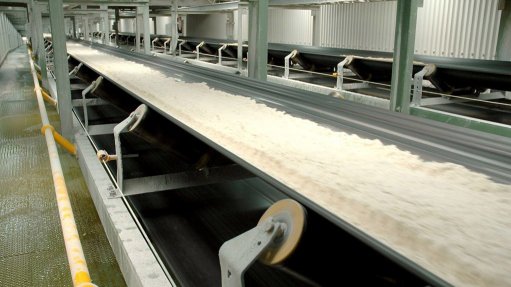
Alumina
JOHANNESBURG (miningweekly.com) – TSX-listed Orbite Aluminae has been granted up to $4.5-million in nondilutive funding towards the development, demonstration and commercialisation of its technology for the processing of red mud.
Orbite CEO Glenn Kelly said on Monday that the funding from Sustainable Development Technology Canada (SDTC) would allow Orbite to accelerate the development of its waste monetisation initiative.
“With some three-billion tonnes of red mud stored worldwide and an additional 120-million tonnes being produced yearly, as well as well over 50-million tonnes of fly ash being produced annually, waste monetisation represents a very significant commercial opportunity for Orbite that the company is now gearing up for," he explained.
Canada's Minister of Natural Resources Greg Rickford advised that the Canadian government was positioning the country as a global leader in the clean technology sector by supporting innovative projects, such as Orbite’s technology to remediate red mud and fly ash, adding that the objective was aimed at growing “our economy while contributing to a cleaner environment”.
Red mud, the waste product generated by the Bayer process, the industrial process used for refining bauxite to obtain alumina, the raw material for the electrolytic production of aluminium, represented a long-term environmental and financial liability for the entire alumina industry.
A typical bauxite refinery generated one to two times as much red mud as alumina. The waste was usually stockpiled in open-air tailings ponds, although, in some cases, it was disposed of in the ocean, Orbite pointed out.
"By developing our resources responsibly, exploring next-generation transportation and advancing clean energy technology, the projects announced today will create jobs and improve innovation opportunities in Quebec and across Canada," commented Rickford.
Kelly said Orbite was pleased with the support and recognition from the SDTC for the “potentially groundbreaking” application of the company’s technology.
The Orbite process was able to use red mud as a feedstock, extracting all the valuable constituents, including rare earths and rare metals, alumina, magnesium oxide and titanium dioxide, while only returning a small fraction of inert material. “In this way, the Orbite process not only contributes to the remediation of an environmental problem but turns a liability into an asset,” added the company.
Besides red mud, Orbite's waste monetisation technology was also applicable to other significant industrial waste sources, such as fly ash from coal-fired power plants, or serpentine tailings from asbestos mining.
The funding was subject to satisfactory financial commitment by an industrial partner, fulfillment of project milestones, usual due diligence and other customary conditions. Orbite was presently in negotiations with Veolia and others in this regard.